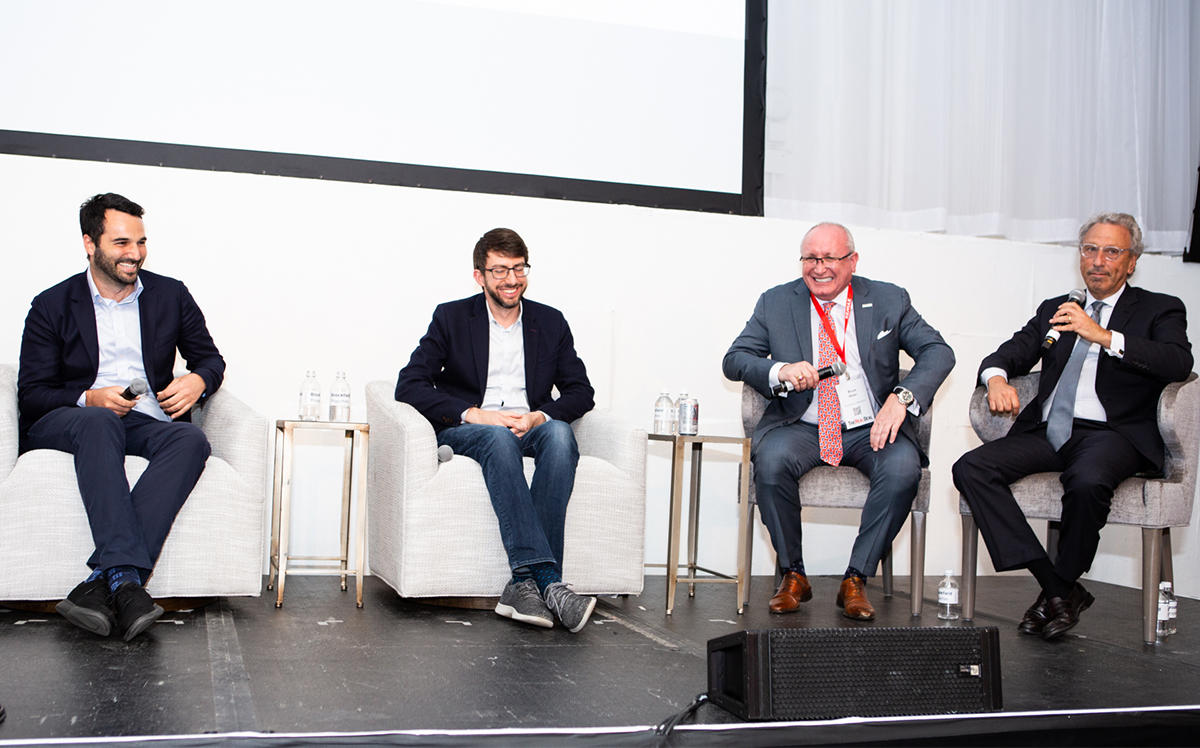Trending
Even with an economic downturn looming, the flex-space industry will grow explosively: TRD forum panelists
Gosin, Mosler, Hargreaves and Hodari upbeat about long-term prospects, despite downturn concerns

With the current cycle of economic expansion soon to become the longest in U.S. history, an impending downturn is on everyone’s minds – and could signal the first real test for the viability of the flexible space industry.
“The issue with co-working and flex-working is that it’s a very capital intensive business. It constantly needs fuel to grow,” Newmark Group CEO Barry Gosin said at The Real Deal’s New York showcase on Wednesday, contrasting it with tech startups that tend to be more scalable. “I think it has tech elements to it, but it is a real estate business.”
Gosin, whose company is one of flexible-office startup Knotel’s prominent financial backers, joined the heads of other traditional and “new age” real estate firms to discuss the future of the industry amid an uncertain economic environment. TRD reporter David Jeans moderated the panel.
“My suspicion is that a recession would be painful for us,” Jamie Hodari, CEO of flexible office firm Industrious said. “However, from my point of view this is an outsourcing industry,” he continued, noting that such industries often “sputter along for a while” before reaching a crucial turning point, and that co-working’s ability to weather the storm would depend on how far it progressed on that trajectory.
“A lot of clients say the recession will be when they double down on their outsourcing needs,” Hodari noted.
Meanwhile, co-living as an industry may still be at an earlier stage of development. “Some of the trends are similar to co-working,” Brad Hargeaves, CEO of co-living firm Common said, noting that the sense of shared community provided by co-living resembles that of co-working when it first began.
“This is a long-roll business. Our average turnaround is about two years,” he continued. “We’re opening deals now that we signed in 2016, 2017.”
Hargreaves said co-living is about five-to-10 years behind co-working.
Beyond short-term worries, the panelists were all optimistic about the long-term prospects of such new, flexible models for utilizing commercial and residential space.
“This space is going to grow because it’s what corporates have wanted for a long time,” Bruce Mosler, chairman of Global Brokerage at Cushman & Wakefield said, noting that although his firm has not invested or built a co-working or flexible-office platform of its own as brokerage competitors have, it’s keeping a close eye on the industry.
“We want to be in a position to offer the full spectrum of what’s out there,” he added.
At the same time, these new models have continued to evolve, with panelists pointing to management agreements with landlords as a more favorable arrangement than traditional leases.
“We don’t really do arms-length leases with landlords anymore,” Hodari said.
Hargreaves noted that in the case of co-living, the business “has been forced into management agreements from day one, because of the nature of residential leasing,” where leasing large amounts of space is rather uncommon.
Looking forward, there are also pitfalls to avoid. Gosin expressed skepticism at the idea of a property being 100-percent occupied by co-working space, as is the case with the 27-story 110 Wall Street, which Rudin Management recently put on the market.
“I’m not a big fan of a co-working space taking more than 15-20 percent of a building, because I think then you diminish the credit quality of a building,” he said. “I assume their ability to finance will be significantly diminished.”
Hodari expressed a similar sentiment, noting that his “holy grail” for co-working would involve a mix of long-term, middle-term and flexible leases within a single property – a goal which may be five years away from becoming a reality.
Gosin also noted that co-working firms run the risk of focusing too much on amenities, which are “enormously hard to run.” Hodari agreed that overamenitization was a big danger for the industry. “We’re right at the edge of that,” he said.




